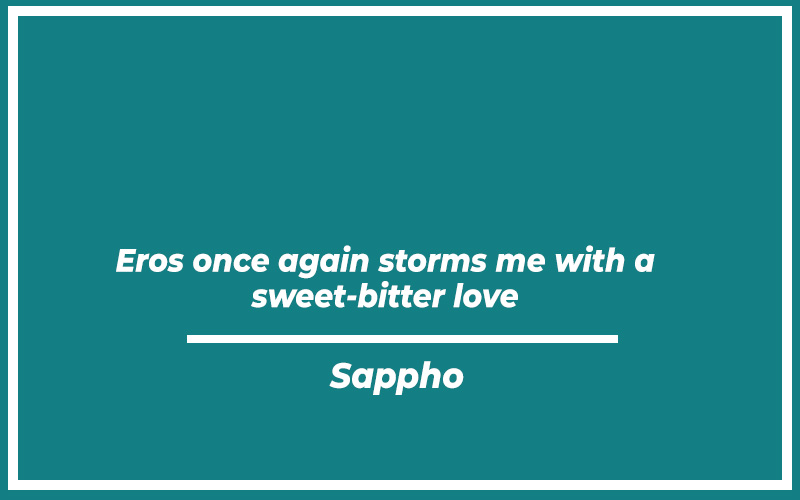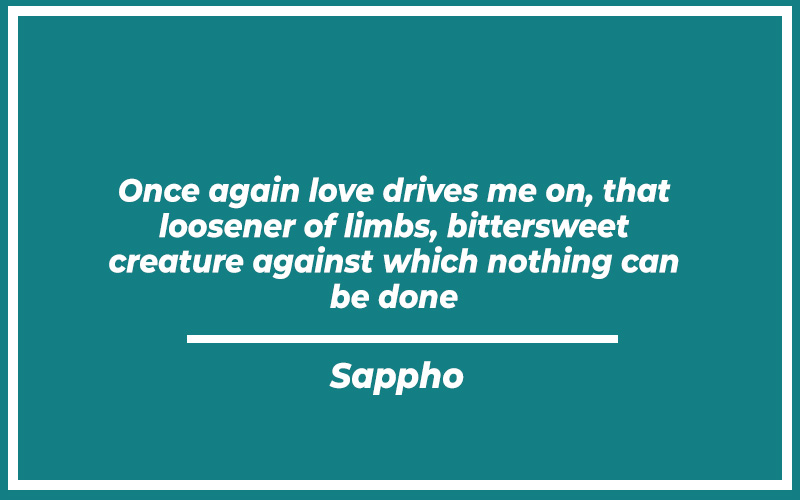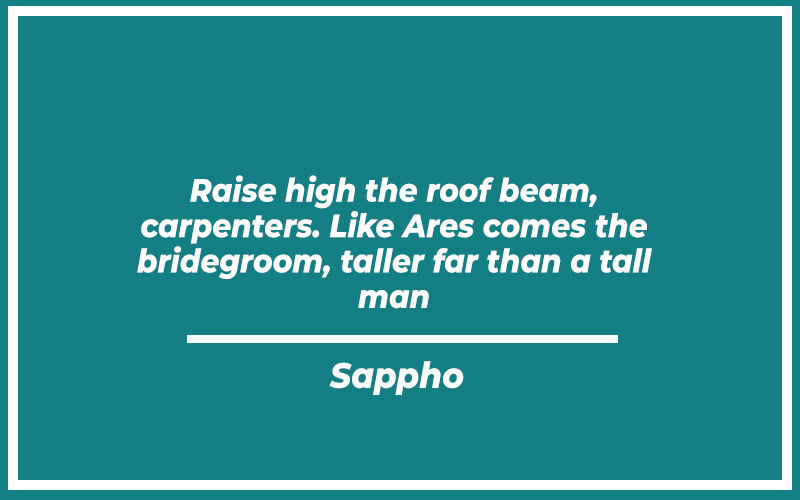Sappho was a poet who lived around 600 BC and wrote passionate verses that people have come to enjoy.
While most of her work only survives in fragments, her poems about love, loss, and the natural world continue to resonate deeply.
Let’s get started!
Sappho Quotes

“Eros once again storms me with a sweet-bitter love.” – Sappho
Sappho’s portrayal of Eros, the Greek god of love, conveys the duality of romantic passion. The term “sweet-bitter” encapsulates the simultaneous joy and pain that love can bring. This quote reflects the tumultuous and overwhelming nature of love, likening it to a storm that disrupts and invigorates the heart.
Sappho’s exploration of these complex emotions highlights her profound understanding of love’s multifaceted character, making her poetry resonate with those who have experienced the highs and lows of deep affection.
Also Read: Inky Johnson Quotes (with Explanations)
“He is dying, Cytherea, your tender Adonis, what should we do? Beat your breasts, girls, tear your tunics…” – Sappho
This quote illustrates Sappho’s engagement with mythological themes, specifically the tragic love story of Adonis and Aphrodite (Cytherea). The imagery of mourning and ritualistic grief underscores the intensity of their love and loss.
Sappho’s vivid depiction of the lamentation rituals reflects the deep emotional impact of Adonis’s death. Her use of mythological references enriches her poetry, connecting personal emotions with broader cultural narratives, and showcasing her ability to evoke powerful imagery through ancient myths.
“The evening star is the most beautiful of all stars.” – Sappho
Sappho’s admiration for the evening star (Venus) reflects her appreciation for natural beauty. The evening star, often associated with love and desire, symbolizes beauty and brilliance in the night sky. This quote highlights Sappho’s connection to the natural world and her ability to find beauty in celestial phenomena.
Her poetic vision elevates ordinary experiences, turning them into moments of profound reflection and appreciation. Sappho’s sensitivity to nature’s beauty is a recurring theme in her work, adding depth to her lyrical expressions.
“Some say an army of horsemen, or infantry, A fleet of ships is the fairest thing On the face of the black earth, but I say It’s what one loves.” – Sappho
In this quote, Sappho contrasts societal values with personal affection. While others might admire military might and grandeur, she finds the greatest beauty in love. This perspective challenges conventional notions of power and glory, emphasizing the importance of personal connections and emotions.
Sappho’s poetry often elevates the personal and intimate over the grand and public, offering a unique and deeply humanistic viewpoint. Her focus on love as the ultimate source of beauty highlights her profound emotional insight.
“You will have memories because of what we did back then when we were new at this.” – Sappho
This quote captures the nostalgia and lasting impact of early experiences in love. Sappho reflects on the formative moments of a relationship, suggesting that these memories will endure. The simplicity and directness of her language convey a deep emotional resonance, highlighting the significance of shared experiences.
Sappho’s ability to evoke powerful memories through her poetry speaks to her understanding of the enduring nature of human connections and the lasting impressions they leave on our hearts and minds.
“In gold sandals dawn like a thief fell upon me.” – Sappho
Sappho’s vivid imagery in this quote personifies dawn, depicting it as a thief in gold sandals. This metaphor captures the sudden and sometimes unwelcome arrival of a new day, intruding on the night. The use of gold suggests beauty and value, while the thief imagery implies stealth and disruption.
Sappho’s ability to blend beauty with a sense of intrusion reflects her nuanced understanding of life’s transitions. Her poetic language transforms everyday occurrences into rich, evocative experiences.
“Virginity, virginity, when you leave me, where do you go? I am gone and never come back to you. I never return.” – Sappho
This quote addresses the theme of lost innocence and the irreversible nature of certain life changes. Sappho’s personification of virginity as something that leaves and never returns underscores the permanence of this transformation.
The lamenting tone reflects a sense of loss and the inevitability of change. Sappho’s exploration of such personal and intimate themes demonstrates her bravery in confronting the complex emotions associated with growth and change, making her work timelessly relevant.
“You may forget but let me tell you this: someone in some future time will think of us.” – Sappho
This quote by Sappho emphasizes the enduring nature of human connections and memories. Even when we think our actions and relationships might be forgotten, they often leave a lasting impression on future generations.
Sappho’s reflection highlights the universal longing for remembrance and legacy. It speaks to the idea that our lives, relationships, and the love we share can transcend time, becoming a part of the collective human experience that endures beyond our immediate existence.
“Their heart grew cold they let their wings down.” – Sappho
In this poignant line, Sappho captures the essence of emotional desolation and resignation. The imagery of a heart growing cold and wings being let down symbolizes the loss of hope and vitality. It suggests a moment of giving up or surrendering to despair.
Sappho’s ability to convey profound emotional states through vivid metaphors is a hallmark of her poetic genius. This quote reflects the fragility of the human spirit and the impact of life’s challenges on our inner world.

“Once again love drives me on, that loosener of limbs, bittersweet creature against which nothing can be done.” – Sappho
Sappho’s description of love as a “loosener of limbs” and a “bittersweet creature” highlights the dual nature of romantic passion. Love is portrayed as both exhilarating and debilitating, a force that compels and overwhelms.
This quote encapsulates the intensity of love’s impact, its power to inspire and torment in equal measure. Sappho’s exploration of love’s complexities resonates deeply, capturing the timeless struggle to navigate its highs and lows.
“Without warning as a whirlwind swoops on an oak Love shakes my heart.” – Sappho
Here, Sappho uses the metaphor of a whirlwind to describe the sudden and overwhelming nature of love. The image of an oak being shaken by a powerful force illustrates how love can destabilize even the strongest of hearts.
This quote reflects the unpredictable and all-consuming aspects of romantic attraction. Sappho’s vivid depiction of love’s forceful entry into one’s life underscores its ability to profoundly affect our emotions and sense of stability.
“The moon and the Pleiades have set, it is midnight, and the time is passing, but I sleep alone.” – Sappho
Sappho’s evocative imagery in this quote conveys a sense of loneliness and longing. The setting of the moon and the Pleiades, coupled with the passage of time, underscores the stillness and solitude of midnight. The poet’s solitude is palpable, highlighting her yearning for companionship.
This quote captures the melancholic beauty of night and the deep sense of isolation that can accompany it, reflecting Sappho’s ability to express complex emotions with simplicity and grace.
“Frankly I wish I were dead. When she left, she wept.” – Sappho
This raw and emotional quote reveals Sappho’s profound sense of loss and despair following the departure of a loved one. The stark declaration of wishing for death underscores the depth of her sorrow. Sappho’s candid expression of grief and abandonment is a testament to her willingness to explore the darkest aspects of the human experience.
This quote exemplifies her ability to convey intense emotions with unflinching honesty, making her work resonate deeply with readers across time.
“In the crooks of your body, I find my religion.” – Sappho
Sappho’s declaration here elevates physical love to a spiritual level, finding sacredness in the intimacy shared with a lover. This quote reflects the profound connection and reverence she feels for her beloved, equating their embrace with a religious experience.
Sappho’s poetry often explores the divine aspects of love and desire, blurring the lines between the earthly and the sacred.
“Someone will remember us I say even in another time.” – Sappho
This quote reflects Sappho’s deep awareness of the enduring impact of human connections and memories. Even in ancient times, she recognized that love and relationships leave an indelible mark on our lives, transcending the immediate moment.
This line highlights her belief in the permanence of emotional bonds, suggesting that love and friendship will be remembered and cherished by future generations. Sappho’s poetry often revolves around the themes of love, longing, and memory, capturing the essence of human experience in a way that resonates across time.
“What is beautiful is good, and who is good will soon be beautiful.” – Sappho
This quote intertwines beauty and goodness, suggesting that moral virtue and aesthetic appeal are inherently linked. Sappho implies that true beauty goes beyond physical appearance and is reflected in one’s character and actions.
In ancient Greek culture, the concept of kalokagathia (the unity of the good and the beautiful) was highly esteemed, and Sappho’s words echo this philosophy. Her poetry often explores the idea that inner virtues enhance outer beauty, creating a harmonious balance between the two.
“There is no place for grief in a house which serves the Muse.” – Sappho
Sappho here emphasizes the transformative power of art and creativity. Serving the Muse, or dedicating oneself to the pursuit of artistic expression, leaves no room for sorrow. This suggests that engaging with art and poetry can provide solace and elevate the human spirit, pushing away grief and despair.
Sappho’s own life and work exemplify this belief, as she used her poetry to express and transcend her own emotional experiences, finding joy and meaning through her creative endeavors.
“Love is a cunning weaver of fantasies and fables.” – Sappho
This quote highlights the enchanting and sometimes deceptive nature of love. Sappho likens love to a weaver who crafts intricate stories and illusions, captivating the heart and mind. Love’s power to create beautiful yet sometimes unrealistic dreams is a recurring theme in Sappho’s work.
Her poetry often explores the complexities of romantic desire, acknowledging both its allure and its potential for causing emotional turmoil.
“May I write words more naked than flesh, stronger than bone, more resilient than sinew, sensitive than nerve.” – Sappho
Sappho’s aspiration to write words that are raw, powerful, and deeply sensitive reflects her commitment to capturing the full intensity of human emotion. This quote underscores her desire to transcend physical limitations through her poetry, creating verses that are both vulnerable and enduring.
Her work often delves into the deepest aspects of love, pain, and desire, aiming to touch the reader’s soul with its authenticity and emotional depth.
“Stars veil their beauty soon / Beside the glorious moon, / When her full silver light / Doth make the whole earth bright.” – Sappho
In this vivid imagery, Sappho portrays the moon’s brilliance overshadowing the stars’ beauty. This quote illustrates her mastery of visual metaphors, using celestial bodies to convey themes of beauty and dominance.
The moon’s light, illuminating the earth, symbolizes the overwhelming presence of love or a beloved person, outshining everything else. Sappho’s ability to draw parallels between nature and human emotions is a hallmark of her lyrical style.
“Although they are only breath, words which I command are immortal.” – Sappho
Sappho’s belief in the enduring power of words is encapsulated in this quote. She recognizes that while words are fleeting and intangible, they hold the potential to achieve immortality through their impact and legacy.
This perspective aligns with the ancient Greek reverence for poets and their role in preserving culture and memory. Sappho’s own work, though only partially preserved, continues to resonate with readers today, illustrating the timeless power of poetic expression.
“I would rather see her lovely step and the motion of light on her face than chariots of Lydians.” – Sappho
Sappho’s quote contrasts the beauty of her beloved with grandiose displays of wealth and power. By expressing a preference for the simple, graceful movements of her lover over the splendor of Lydian chariots, Sappho emphasizes the value of personal affection over material opulence.
This perspective highlights her deep emotional connection and appreciation for the intimate moments that make love special. Sappho’s poetry often focuses on personal experiences and emotions, making her work timeless and relatable.
“I said: ‘Go with my blessing if you go, always remembering what we did. To me you have meant everything, as you well know.’” – Sappho
This poignant quote reflects Sappho’s acceptance of parting ways while cherishing the memories of a significant relationship. The blessing given to the departing loved one underscores her grace and understanding.
Sappho’s acknowledgment of the emotional impact and importance of their shared experiences speaks to her depth of feeling. This quote captures the bittersweet nature of farewell, blending sadness with a sense of gratitude and love, highlighting her nuanced understanding of human relationships.
“All the while, believe me, I prayed our night would last twice as long.” – Sappho
In this quote, Sappho expresses a deep longing for extended time with her beloved. The desire for a night to last twice as long reflects the intensity of her affection and the fleeting nature of joyful moments. Sappho’s poetry often captures the ephemeral beauty of love and the yearning for more time.
This line resonates with anyone who has wished to prolong moments of happiness, showcasing her ability to convey universal emotions through her lyrical expressions.
“You came and I was longing for you. You cooled a heart that burned with desire.” – Sappho
Sappho’s quote captures the relief and fulfillment of reuniting with a loved one. The imagery of cooling a heart that burned with desire emphasizes the intensity of her longing and the soothing effect of their presence.
This quote highlights the profound emotional impact that loved ones can have, providing comfort and satisfaction. Sappho’s ability to articulate such deep feelings of desire and fulfillment showcases her poetic brilliance and emotional insight, making her work resonate across time.
“When anger spreads through the breath, guard thy tongue from barking idly.” – Sappho
This quote reflects Sappho’s wisdom regarding the management of anger. She advises caution in speech when emotions run high, highlighting the importance of self-control. The metaphor of anger spreading through the breath and the imagery of barking idly convey the potential harm of uncontrolled outbursts.
Sappho’s insight into human behavior and emotional regulation demonstrates her deep understanding of the complexities of the human psyche. This advice remains relevant, emphasizing the value of measured and thoughtful communication.

“Raise high the roof beam, carpenters. Like Ares comes the bridegroom, taller far than a tall man.” – Sappho
Sappho’s use of vivid imagery in this quote celebrates the grandeur of a bridegroom, likening him to Ares, the god of war.
The call to raise the roof beam higher reflects the anticipation and reverence for the groom’s arrival. This quote captures the cultural significance of weddings and the heroic portrayal of the bridegroom.
Also Read: Rizz Quotes (with Explanation)
Final Thoughts
The universal experiences of love’s power, the sting of loss, and the beauty of the natural world transcend time and cultural boundaries.
Though separated by millennia, Sappho’s bold exploration of female desire urges us to embrace love in all its messy glory, cherish the fleeting beauty that surrounds us, and express our deepest emotions with honesty and passion.

